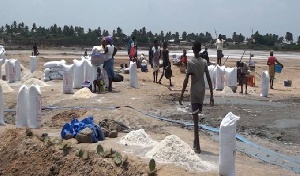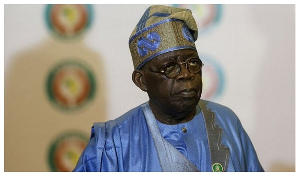Illegal miners have taken over the 42,000-acre government-acquired Songor Salt Project Site, restricting the Songor Salt Mines to just 3% of the acquired land.
The company is therefore unable to produce enough salt to meet the growing demand for the commodity from countries in the sub-region.
Chairman of the Interim Management Committee, Lt. Colonel (rtd) Jacob Dottey told the B&FT that although government acquired about 41,680 acres of land for salt production, only 1248 acres of land, representing 3%, is currently used by the company for salt production.
"They have taken over 97% of the initially acquired land and are further encroaching on the small 3% access land left.
"We have nowhere to discharge our waste water, because when we want to dump our waste water they protest. The people too are organized. When you bring the police, one blow alarm and they all run away.
According to Lt. Col. Dottey, chemicals such as potassium chloride and others found in the company’s discharge water which encroachers use in salt production is harmful to human health.
"The waste water we discharge from our ponds is what the encroachers use to produce their salt. When you produce salt, you cannot remove all the sodium chloride from the brian, so we discharge that brian, and that brian also contain some other salts which is not good for the human body, such as magnesium chloride, potassium chloride, magnesium sulphate,” he added.
One major challenge he mentioned was that the company spent huge sum of money to get their raw material from the sea (Brian), which they do not have and thereby making their products cheaper.
Another challenge is that they are tapping any available lands, especially Agbakpe which belongs to the mine and not for the indigenes, and they are tapping into their evaporator for salt water.
Lt. Col. Jacob Dottey therefore threatened to use legal means to retrieve the government invaded land. "They have come too much and we will push them back through the court".
Songor Salt Mine have currently 24 ponds and five reservoirs and produces a total amount of 60,000 metric tones annually.
Lt. Col. Jacob Dottey said the 60,000 metric tones is the maximum they can produce. According to him, the company is unable to meet demand.
“80% of our customers are from African countries including Burkina Faso, Mali, Chad, Ivory Coast , Togo and Benin,” Lt. Col Dottey said.
Meanwhile, the B&FT upon a visit to the encroached area saw tens of people busily dredging their ponds in preparation for mining new products.
In an interview with some encroachers, David Agbedanu, a student said he comes to the area to mine salt in order to make some money for his upkeep.
They usually get their source of water for mining salt from waste water discharged by the Songor Salt Company, but the sea water is no longer being discharged, therefore they draw water from a nearby canal.
Eric Tetteh who was seen busily packaging salt for some customers, with the name on the sack "Maa U Iodate Salt and Eunice Iodated Salt". He said the more the available water, the more the salt.
Business News of Friday, 4 September 2015
Source: B&FT













